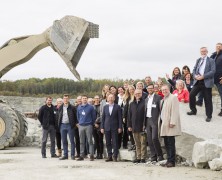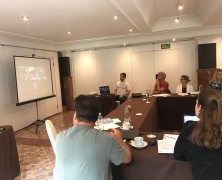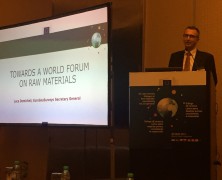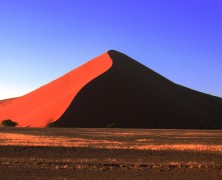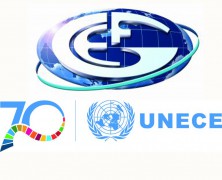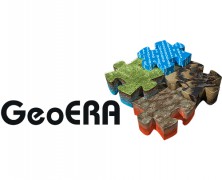From 22-24 September, more than 130 quarries and plants in 27 countries opened their doors welcoming around 30.000 children and adults to celebrate European Minerals Day and have the rare opportunity to explore the world of minerals and experience how they are sustainable extracted. Typical activities include school visits, guided tours, workshops, exhibitions, biodiversity projects, and many more have been organised. Slavko Solar, EuroGeoSurveys Secretary General stated during the launch of the European Minerals Day event: “These events convinced me that mine or quarry relationships with local community are crucial to obtain, and moreover maintain the social licence to operate. This, next to other communication activities that present mine operation , transparently opens the doors to public awareness, acceptance and finally trust as wishfully written in the EU Document entitled EIP Strategic Implementation Plan.” The 2017 European Minerals Day Launch took place on 21 and 22 September, hosted under the Estonian EU Presidency, kindly hosted by Nordkalk and Kunda Nordic Tsement at their operations in Kurevere and Kunda. It welcomed representatives from the European Commission, Estonian government, partnering sectors, academia, NGOs, media and local administrations. The balanced and insightful presentations by the guest speakers was complemented by visits of both quarry operations, the cement plant and port in Kunda, a blasting in Kurevere and introduction to the local biodiversity projects on birds and orchids. The sector is important to the EU jobs and growth agenda as it directly employs around 1 million people across 30,000 active mines, quarries and plants in Europe, and has an annual turnover of more than €150 billion. The minerals sector forms an integral part of the European value chain with 70% of EU manufacturing depending on the minerals, metals and raw materials mined. “We need to keep jobs, growth, investment and...
Outcomes from the Raw Materials Foresight Methodology Workshop in La Palma, Gran Canaria
posted by EuroGeoSurveys
La Palma Research Centre hosted the MICA project’s ‘Raw Materials Foresight Methodology Workshop’ on the 10th and 11th of May in Las Palmas de Gran Canaria, Spain. The main objective of the workshop was to frame the MICA foresight methodology recommendations in a minerals policy context on a 2030-2050 timescale. Workshop participants included MICA project partners and a number of external experts on both foresight and raw materials. On the first day of the meeting, the external experts and the research centre team presented examples of foresight case-studies in both raw materials and other fields. These presentations were successful in generating broad-ranging discussion on foresight methods utilised in the case studies, common constraints on the foresight process, and how to establish more accurate proxies during foresight evaluation. The second day began with a review and summary of the findings of the first day. Subsequently, there were further presentations and discussions aimed at establishing a common vision and recommendations for EU minerals policy and the upcoming MICA ‘Raw Materials Intelligence Platform’ (EU-RMICP), which is due to be launched in January 2018. The workshop ended on a positive note after a final group exercise which took place at Columbus House. During this session, workshop participants explored potential pathways for the future of the mineral raw materials sector. The experts also provided recommendations on how foresight studies could aid EU-RMICP users in understanding how different factors may influence the sector over longer time horizons. During the workshop, recommendations were agreed upon to improve EU-RMICP functionality by answering stakeholders’ needs with custom foresight approaches. The group also gave their ideas on how to enhance the development of the MICA ‘Raw Materials Foresight Guide’, which will be released in August...
The FORAM network grows: outcomes from EU-Latin America Dialogue on Raw Materials
posted by EuroGeoSurveys
On 8th and 9th May, 2017, the conference ‘EU-Latin America Dialogue on Raw Materials: consolidating the co-operation’ was held in Buenos Aires, Argentina. It was attended by over 50 high-level delegates from Latin American countries, the European Commission, Geological Surveys, international organisations, and European projects. It was the last of a series of conferences in the frame of the EU-Latin America Policy Dialogue on Raw Materials, after the ones held in Lima, Peru (2014), Cartagena de Indias, Colombia (2015) and Santiago, Chile (2016). The ‘Dialogue’, aiming at improving cooperation on raw materials between the European Union and Latin American countries, has focused on cooperation in investment, technology, research and innovation and exchange of good practices on good governance between the two sides of the Atlantic. The Buenos Aires conference subject was on expanding the opportunities for multilateral investments through the new Mineral Development Network Platform; sharing tangible solutions for promptly meeting the increased standards for sustainable mining practices; highlighting the EU companies’ mining expertise and bolster business opportunities. During the conference, participants shared mineral policies best practices. The Secretary General of EuroGeoSurveys gave a speech on ‘Towards a World Forum on Raw Materials’, where he discussed the FORAM project, explaining how the project is organized and the future developments. In particular, he invited the participants not yet involved to become partners of the FORAM Stakeholders Network. The speech raised a big deal of attention, and the European Commission later sent to all participants the information for joining the...
PanAfGeo 1st Training in Mineral Resources Assessment launched
posted by EuroGeoSurveys
The ambitious training programme of the PanAfGeo Project is now a reality. The first training of “WP2 – MINERAL RESOURCES ASSESSMENT” will be held from 5 June 2017 to 16 June 2017 in Windhoek, Namibia. PanAfGeo WP2 will organise seven training sessions in “Mineral Resources Assessment” across Africa during 2017-2019, some of which will be held in English, French and possibly Portuguese. The second Training session will take place in Nigeria in November 2017. BACKGROUND “PanAfGeo” for “Pan-African Support to the EuroGeoSurveys-Organisation of African Geological Surveys (EGS-OAGS) Partnership” is a project which supports the training of geoscientific staff from African Geological Surveys through the development of an innovative training programme that includes the acquisition and development of important professional skills that complement their qualifications and technical skills. The training programme is carried out by world-class geoscientific experts coming from African and European Geological Surveys. PanAfGeo is co-funded by the European Commission (Directorate-General of Development and International Cooperation) and by a Consortium of 12 European Geological Surveys coordinated by the French Geological Survey (BRGM). To find out more about PANAFGEO training programme please visit...
EFG/UNECE conference
posted by EuroGeoSurveys
International cooperation on natural resources: geoscientists’ contribution to enhanced governance, policy making and attainment of the Sustainable Development Goals EuroGeoSurveys will attend the “International cooperation on natural resources: geoscientists’ contribution to enhanced governance, policy making and attainment of the Sustainable Development Goals” Conference that will be held on the 9-10 February 2017 at the Royal Belgian Institute of Natural Sciences, in Brussels. EuroGeoSurveys Secretary General Luca Demicheli will be present at the Panel Session Socio-economic and environmental drivers for natural resources development and management on the 10th of February. The conference will foster the convergence of terminology and the comparability/compatibility of data, thus contributing to the creation of a solid European Knowledge Database on mineral and energy resources. Such harmonization is equally important to government policymakers and to companies and regulators within the energy and minerals industries, including the users and providers of data on energy and minerals reserves and resources and renewable energy. UNFC will be reviewed, including its potential for application in Europe and beyond and its relationship with other classification and public reporting systems. There will be presentations from speakers representing a range of relevant UNECE and European policy areas linked to energy and minerals, as well as from international and European experts drawn from regulatory authorities, industry and non-governmental organizations. There will also be contributions from representatives of fossil and renewable energy companies, the mining industry and academia. The event is co-organized by the European Federation of Geologists (EFG) and the United Nations Economic Commission for Europe (UNECE). [source: EFG...
Establishing the European Geological Surveys Research Area to deliver a Geological Service for Europe (GeoERA)
posted by admin
Today, more than 40 national and regional Geological Survey Organisations (GSOs) from over 30 European countries have joined forces to launch the ERA‐NET co-fund action “Establishing the European Geological Surveys Research Area to deliver a Geological Service for Europe (GeoERA)”. The integration of the participants’ knowledge and information on subsurface resources, to support sustainable use of the subsurface and to address some of Europe’s grand challenges, is the key aim of GeoERA. The GeoERA programme, was initiated through EuroGeoSurveys – the organisation of European Geological Surveys, as part of the realization of its “vision towards a Geological Service for Europe” and extended to all GSOs on the European continent. It has an overall budget of 30.3 M€, of which 10 M€ is provided by European Commission and the remainder is provided by the GeoERA participants as in‐kind contributions to the funded transnational projects. It will provide interoperable, pan‐European data and information services on the distribution of geo‐energy, groundwater and raw material resources and harmonized methods to assess these. It will also develop common assessment frameworks and methodologies for supporting the European national and regional policy-makers for a better understanding and management of the water‐energy‐raw materials nexus to determine potential impacts and risks of subsurface use. Mrs Teresa Ponce de Leão, EuroGeoSurveys President, says “GeoERA represents the key step for establishing a common European Knowledge Base and to a joint provision of a Geological Service for Europe. The Geological Knowledge Base will provide European stakeholders with open access to objective and seamless data, information, knowledge and expertise on subsurface resources and their sustainable use and management”. Mrs Yvonne Schavemaker, GeoERA Project Manager, highlights the large impact GeoERA will have in integrating and harmonizing national and regional research resources and optimizing pan‐European coverage of geological...

